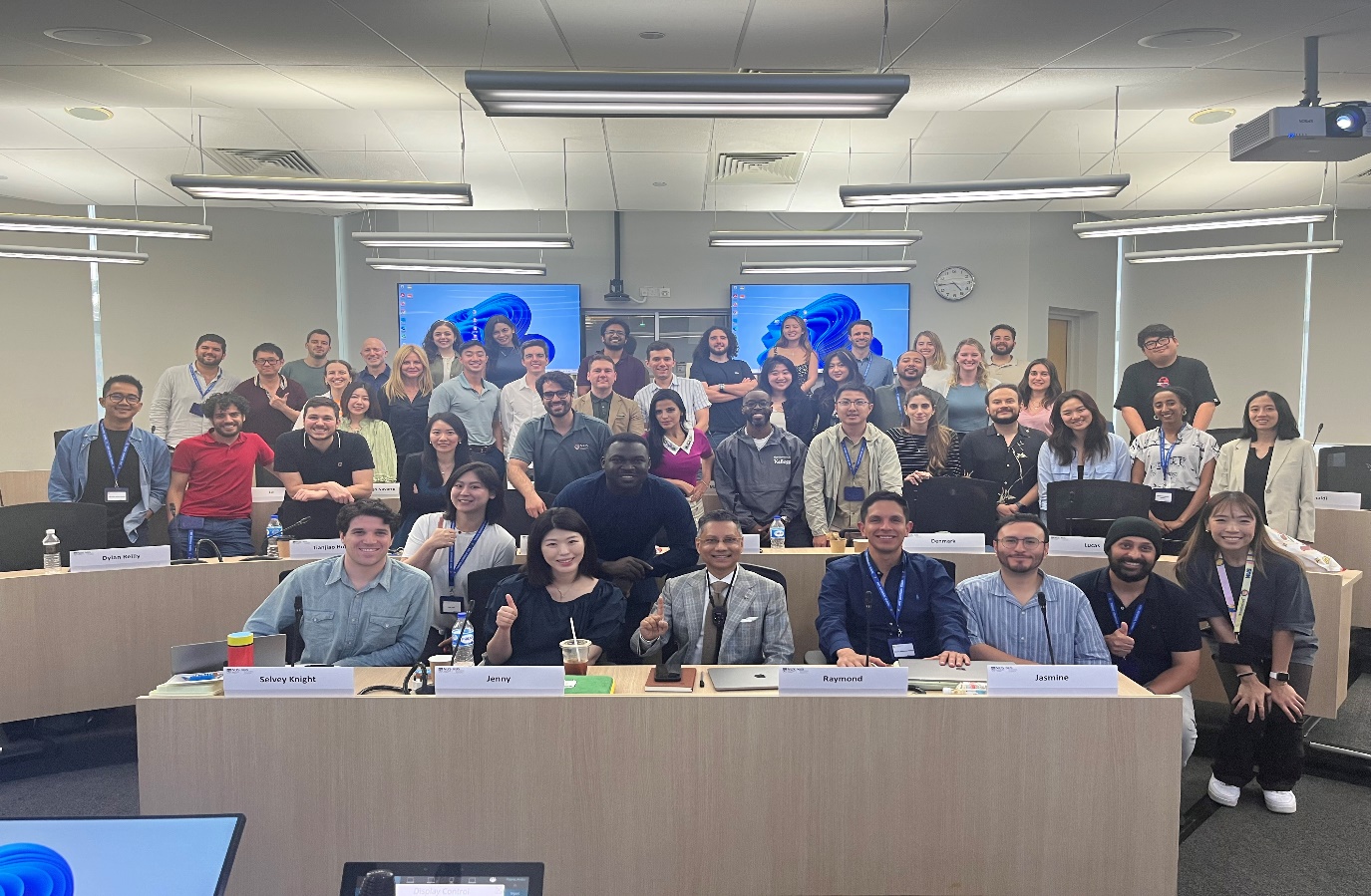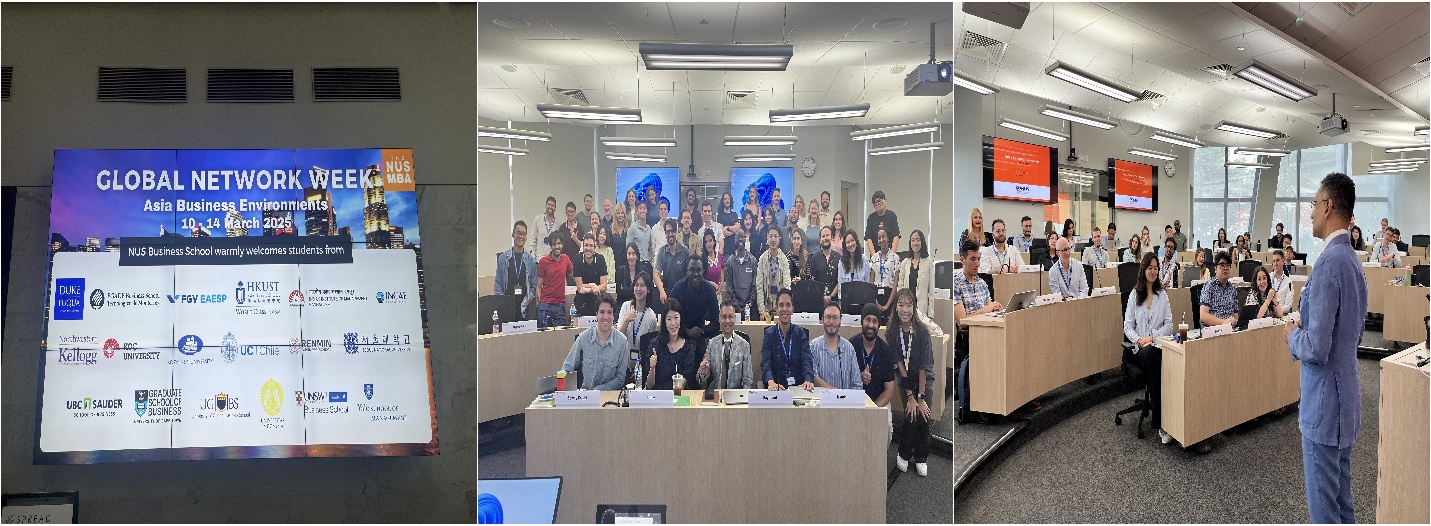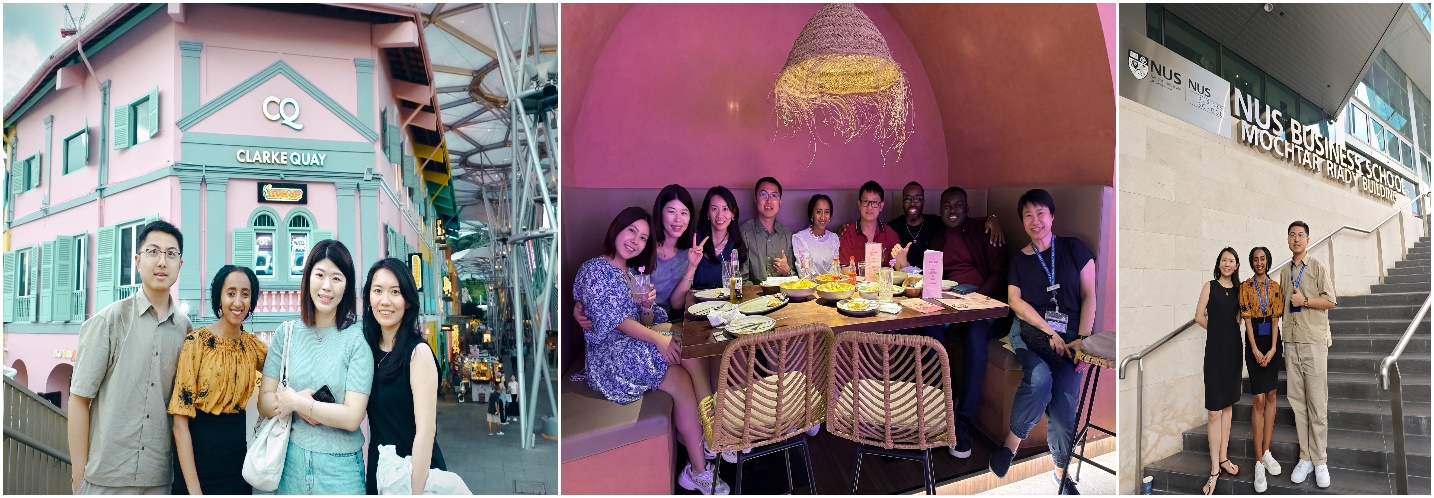A Splendid ‘GNW’ at NUS
- 2025-04-08
Mezekerta Misgina, IMBA Class of 2026 (Cohort 2024)
HUANG Tianjiao, Part-time MBA Class of 2026 (Cohort 2024, P5);WANG Zongying, Part-time MBA Class of 2026 (Cohort 2024, P4)
With the great support from the MBA Programs of the Renmin Business School (RMBS), we spent a wonderful week at National University of Singapore (NUS) for the March 10-14, 2025 Global Network Week (GNW) event, which was taking place simultaneously at 17 business schools within the Global Network for Advancement (GNAM) around the world.
The journey began with a nighttime departure from Beijing, soaring into the dark sky as the city winds down, with Singapore awaiting at sunrise. Upon arrival at dawn, the day started with a walk to Merlion Park, where the iconic statue overlooks Marina Bay's calm waters, followed by a stroll along Sands Bay with stunning skyline views. A visit to Raffles Place blended colonial charm with modern skyscrapers, leading to the historic Victoria Theatre. Sentosa Island offers a peaceful beach walk along Siloso’s golden sands, transitioning from Beijing’s chill to Singapore’s tropical warmth. Breakfast features kaya toast and kopi at a traditional kopitiam, while lunch offers a spicy bowl of laksa in Chinatown. At 5 PM, we joined an ice-breaking event at Vivo City, organized by NUS, adding a social and engaging element to the day’s adventures.
Day 1: Introduction
On March 10th, by 9 AM, we registered and joined the class, which was attended by MBA students from 23 countries and regions.
The Asia Business Environment course provides an in-depth exploration of the diverse and dynamic economic landscapes across Asia. As the world's largest and fastest-growing region, Asia presents both tremendous opportunities and unique challenges for businesses. The course delves into the complex factors shaping the region, including diverse regulatory frameworks, varying cultural norms, and differing levels of technological advancement. We examined key topics such as economic development models, the role of government policies, market-entry strategies, trade dynamics, and the impact of global trends like digital transformation and geopolitical tensions. From the booming economies of China and India to the rapidly developing markets of Southeast Asia, the course emphasized the importance of understanding local contexts to navigate the complexities of doing business in Asia.

Day 2: Culture VS institutions
Day two's insights revolved around the deep-rooted economic and cultural influences shaping Asian values, particularly the impact of agriculture on behaviors like saving habits, collective harmony, and societal structure. The discussion highlighted how national culture affects corporate management, as seen in the Olympus case, where hierarchy hindered information flow. A key learning on change management was the importance of focusing on those open to progress rather than trying to persuade the most resistant. The Genetics Video challenged traditional notions of race and identity, evoking strong emotional reactions. Lastly, the class explored the fine balance between information sharing and innovation, emphasizing that while transparency is valuable, excessive information can stifle creativity and decision-making.
Starting at 5:30 PM, we attended a vibrant networking reception with NUS MBA students. This event provided an excellent opportunity to connect, share experiences, and build professional relationships with peers from diverse backgrounds. It was a dynamic and engaging evening, fostering meaningful conversations and networking in a relaxed atmosphere.
Day 3: Innovation in Emerging Asia: Navigating State Capture and Collaboration
On March 12th, we were introduced the innovation in emerging Asian markets thriving at the intersection of state influence and business strategy. Companies must balance state capture, where political and regulatory environments shape business operations, with collaboration, leveraging government partnerships for growth. Firms like bKash in Bangladesh illustrate how regulatory engagement can unlock market opportunities, while 7-Eleven Indonesia’s failure underscores the risks of unexpected policy shifts. Successful businesses align with state policies through proactive compliance and strategic adaptation, as seen in Haier’s expansion and Tata’s global strategy. In highly regulated industries, firms must internalize external challenges, ensuring agility while navigating government influence. The key to sustainable innovation in Asia lies in balancing market-driven strategies with regulatory foresight, transforming state interactions from obstacles into enablers of long-term growth.

Day 4: Japan, Tigers and China
Day 4 involved the discussion of China’s economic growth, the pressures faced by its youth, and the societal challenges can be related to Japan and the "Asian Tigers" (South Korea, Taiwan, Hong Kong, and Singapore) in several ways. Japan, once the economic powerhouse of Asia, experienced rapid post-war growth through investment in infrastructure and technology, much like China today. However, Japan's economy faced stagnation in the 1990s, partly due to overinvestment and an aging population, similar to the challenges China may eventually encounter. The "Asian Tigers" experienced rapid industrialization and economic growth in the late 20th century through investment, innovation, and export-driven growth. The lessons from Japan and the Tigers' experiences underscore the importance of balancing growth with social well-being, ensuring sustainable development that doesn’t overburden the workforce, and investing in mental health support and work-life balance to prevent societal stress and instability.
Day 5: India and Indonesia; presentation by groups
Last day on 14th March, we explored several significant case studies, focusing on India and Indonesia. Groups delivered presentation on different topics. Apple’s struggles in India were a key topic, highlighting how the company faced difficulties due to the high cost of its products and the price sensitivity of Indian consumers, along with regulatory hurdles and competition from local smartphone brands. Similarly, WeChat’s challenges in Africa were discussed, with the app’s lack of regional adaptation and difficulty in competing with established platforms like WhatsApp being key issues. Uber's failure in Asia, particularly in China and Southeast Asia, was another topic, emphasizing how local competitors such as Didi Chuxing in China and Grab in Southeast Asia were able to capture market share due to better understanding of local consumer needs and regulatory environments. Lastly, the case of Lululemon's entry into Indonesia provided insight into how Western brands face unique cultural and market challenges in Southeast Asia, where the activewear market is still developing and needs strong local partnerships and brand positioning. These case studies reinforced the importance of adaptability, cultural understanding, and strategic partnerships for companies entering emerging markets.

As we concluded this academically enriching and socially uplifting week, we want to extend our heartfelt gratitude to RMBS and NUS, Professor Pasha, our coordinators, and all of our incredible cohorts from 23 countries. This week has been a testament to the power of diverse perspectives and collaborative learning. Through thought-provoking discussions, insightful presentations, and the exchange of ideas, we have not only deepened our understanding of global business environments but also formed connections that transcend borders and cultures. The shared experiences and diverse viewpoints have truly enriched this learning journey, reminding us that innovation, adaptability, and cultural awareness are key to success in today’s interconnected world. We look forward to seeing how the knowledge and insights gained here will empower us all in our future endeavors, and we hope our paths will cross again in the future. Thank you all for making this an unforgettable and transformative experience.
1 | Page



